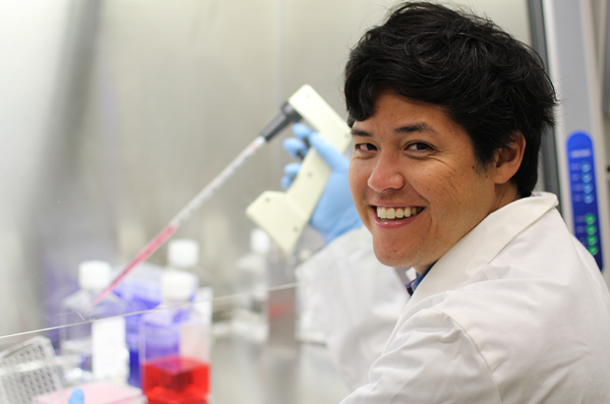USC Stem Cell researcher Justin Ichida, PhD, is forming partnerships between academia, industry and government to accelerate the development of new treatments for patients with ALS, or Lou Gehrig’s disease.
Ichida’s work will marshal the expertise of pharmaceutical company Sanofi and a startup company, DRVision Technologies, along with $1.5 million in federal funding, in his effort to find new drugs to fight amyotrophic lateral sclerosis (ALS).
The source of the three-year grant is unusual — the U.S. Department of Defense. Because military veterans are more likely than civilians to suffer from this fatal disease for reasons that are not yet understood, the Defense Department funds two ALS Therapeutic Development Awards each year.
“The awards are intended to either identify a new drug target or candidate for ALS, or to take an existing one further into the clinic,” said Ichida, an assistant professor in the Department of Stem Cell Biology and Regenerative Medicine and the director of the Choi Family Therapeutic Screening Facility at the Keck School of Medicine of USC.
Ichida has pioneered a way to prescreen drug-like compounds in the laboratory on cells from patients with the most common form of ALS. To accomplish this, Ichida directly reprograms patients’ skin cells into motor neurons, which exhibit the disease’s signature degeneration. He then puts these reprogrammed motorneurons into a robotic screening machine, which exposes them to drug-like compounds and captures microscopic movies of the results. In his pilot screening of 800 compounds, he found four that kept these motor neurons alive in Petri dishes — and eventually might do the same in patients.
With the new grant, Ichida will scale up efforts starting in September 2015, screening 2,000 FDA-approved drugs in his laboratory. Sanofi will screen an additional 40,000 drug-like compounds.
The other industry partner, DRVision Technologies, is designing software to analyze the resulting microscopic images for signs of improved motor neuron survival. If the funded study reveals viable hits, chemists at Sanofi may develop these compounds into safe, effective drugs to test in a human clinical trial.
Sanofi officials were introduced to Ichida’s research by USC Stem Cell Program Director Qing Liu, PhD, who is managing the project. Ichida said the partnership is one of the first examples of taking a patient-specific disease model from stem cells and using it to discover drugs at a pharmaceutical scale.
— Cristy Lytal


